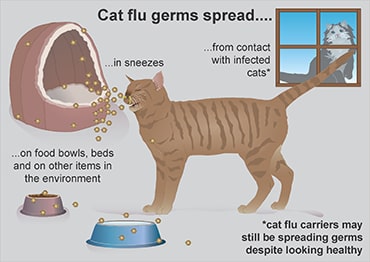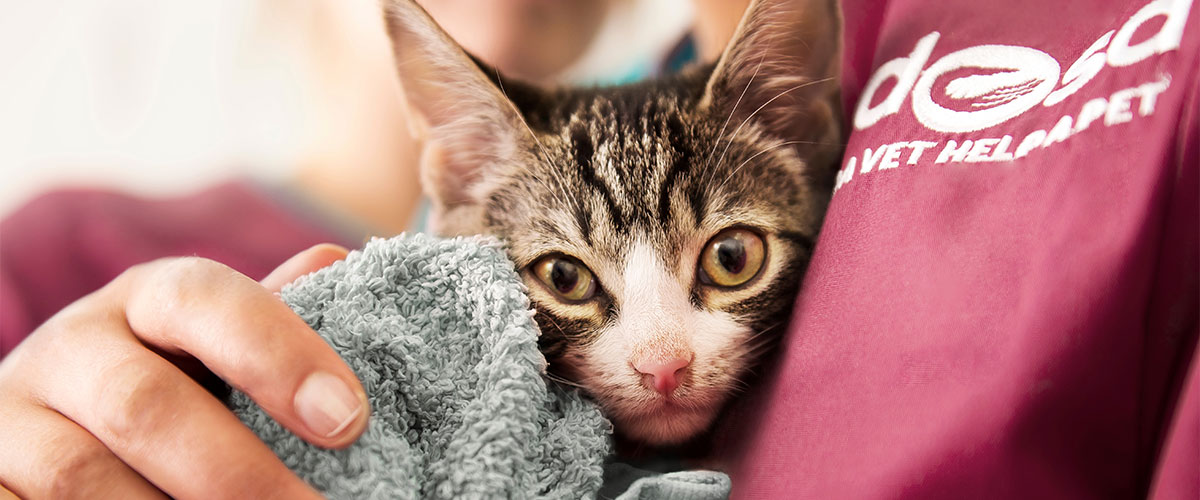Cat flu
Overview
- Cat flu is an illness that causes similar symptoms to human flu (a high temperature, sneezing, weepy eyes and a snotty nose).
- Unfortunately, once a cat has caught cat flu it’s possible for them to become a lifetime carrier and suffer symptoms throughout life.
- Fortunately, we can protect our cats from flu by vaccinating them.
- There is no specific cure, but treatment can help reduce symptoms, speed up recovery, and limit future flare-ups.
- Kittens are usually more severely affected than adults because they find it harder to fight infections.
- Contact your vet if you notice the symptoms of cat flu.
General information
Cat flu is an illness that causes similar symptoms to human colds/flu (a high temperature, sneezing, weepy eyes and a snotty nose).
It’s extremely contagious and spreads in saliva, snot, sneezes and on items such as food bowls and bedding. Cat flu can be serious, especially in kittens; some recover, but others become carriers and continue to have symptoms throughout their life.
Cat flu vaccination
Fortunately, we can vaccinate against cat flu. Have your cat vaccinated as soon as they are old enough (8-9 weeks) and continue regular vaccines throughout their lives. Don't let them outside until they have been fully vaccinated.
Spread
Cat flu germs spreads in saliva, snot, sneezes and on surfaces such as food bowls and bedding (see image below). Cats that have recovered from cat flu often continue spreading germs for a few weeks after they appear better. Some cats never fully get rid of cat flu and continue to shed germs throughout their life.

Cat flu can spread easily round the home.
Symptoms of cat flu
- Sneezing
- Weepy eyes
- A snotty nose
- Painful eyes (flu can cause eye ulcers)
- Lethargy (low energy)
- Reduced appetite
- Mouth ulcers
- Fever (high temperature)
- Sore throat (you might see swallowing or gagging)
- Coughing

Cat with cat flu - note weeping eyes and snotty nose
Treatment
There is no cure for cat flu but there are many things that can be done to reduce symptoms and speed up recovery, including:
- Anti-inflammatories - to reduce inflammation and bring down a high temperature.
- Mucolytics - help break down mucus in your cat’s nose and airways to help them breathe more easily. This also helps them to smell their food which is important to keep them eating.
- Eye drops - lubricating eye drops (similar to artificial tears) can be used to sooth sore eyes while they heal. Antibiotic eye drops will be given if your vet suspects an eye infection. IMPORTANT: Antibiotic eye drops will only be given if necessary, and won’t help if your cat’s symptoms are caused by a virus. If your cat is given eye drops, follow the instructions and complete the course (even if they look better before the course has finished).
 Video found at youtu.be/_G8qWv4PKss
Video found at youtu.be/_G8qWv4PKss
- Antibiotics - antibiotics don’t kill viruses, so they will only be given if your vet thinks your cat has a bacterial infection. If your cat is prescribed antibiotics, make sure you finish the whole course, even if they seem better before it’s finished.
- Antivirals - can help speed up recovery from cat flu. Antivirals need to be used for three to four weeks, aren’t always effective, and can be very expensive compared to other treatments. Speak to your vet for more information.
- Hospitalisation - if your cat has severe symptoms, becomes seriously unwell, or stops eating and drinking, they are likely to need intensive treatment in your veterinary hospital.
Prevention
Vaccination, vaccination, vaccination - we can vaccinate kittens against flu from 8-9 weeks old. To stay protected your cat will need regular booster vaccinations throughout their life. Even if your cat has had flu in the past, vaccination can help reduce symptoms in the future
Home care for cat flu
Once your cat has been treated by your vet there are some things you can do at home to help them recover:
- Wipe their eyes and nose - to help your cat feel better, smell their food and breathe more easily, use a cotton wool pad soaked in warm water to wipe any discharge from their eyes and nose.
- Reduce stress - keep your cat’s life as stress-free as possible because stress can make illness worse.
- Help them eat - if your cat isn’t eating, add a small amount of warm, smelly food to their meals (e.g. sardines, anchovies or tuna). If this doesn’t work try warming it slightly, make sure it’s not too hot and mix it well.
- Help them breathe. Help your cat break down some of the thick mucus in their airways (and breathe more easily) by sitting with them in a steamy room (i.e. the bathroom while you are having a shower or a bath). Don’t ever force your cat into a steamy room and take them out if they seem stressed at any point.
Recovery and outlook
With treatment, symptoms of flu often get better within one to two weeks. Unfortunately once a cat has caught cat flu, it’s possible they will become a ‘carrier’ and suffer from ‘flare-ups’ throughout their life. Some, less fortunate cat flu carriers have symptoms all the time (perhaps a runny nose, loud breathing, sneezing or weepy eyes), and need to be on constant medication. Cat flu carriers are most at risk of symptoms when they are stressed or poorly.
FAQ's
Can I catch cat flu?
No, cat flu only affects cats, humans and other animals aren't affected by it.
How long does cat flu last in the environment?
Cat flu viruses can survive outside a cat's body for up to a month.
My cat has already had the flu, will vaccination help?
Yes, even if your cat has already had flu, vaccination can reduce symptoms in the future.
Cat flu in kittens
Cat flu often affects kittens more severely than adult cats because it’s harder for them to fight infections. Read more about cat flu in kittens.
Published: June 2020
Did you find this page useful?
Tell us more
Please note, our vets and nurses are unable to respond to questions via this form. If you are concerned about your pet’s health, please contact your vet directly.
Thank you for your feedback
Want to hear more about PDSA and get pet care tips from our vet experts?
Sign up to our e-newsletter
Written by vets and vet nurses. This advice is for UK pets only. Illustrations by Samantha Elmhurst.

